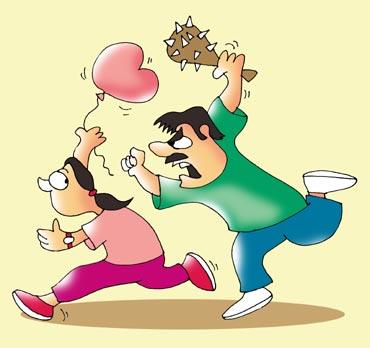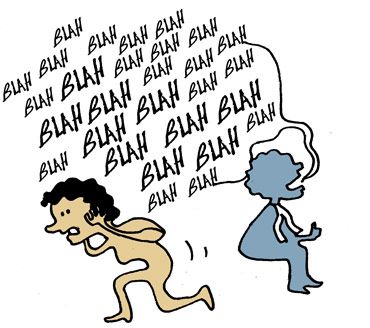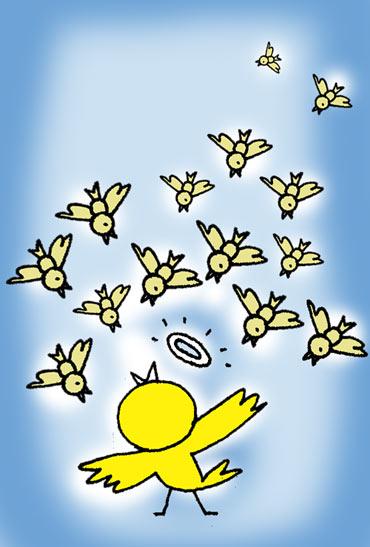Photographs: Uttam Ghosh/Rediff.com ANI
A round up of stories that affect you at your workplace.
From the skiver to the chatterbox, an expert has revealed the "typical" office colleagues that you wish you never had to deal with.
First of all, there is the brown-noser, a shameless worker who is ready to do anything to get a promotion and then there's the lazy git who prefers to focus on Facebook rather than work, Metro.co.uk reported.
Another type pointed out by the expert is the worker bee, who is the first to arrive and last to leave the office, not to mention the skiver who only seems to be in at the most inconvenient time.
Then there's the credit hogger who likes to pass off other's ideas as his or her own.
The "typical types" also include the mug, who says yes to any task give to him, the stress pot, who always finds something to worry about and considers any mistake, no matter how small, as the end of the world.
What to do and what not to do at workplace revealed
Photographs: Dominic Xavier/Rediff.com
Is it okay to give gifts to colleagues or talk about you love life at the workplace?
To answer your questions, famous etiquette authority Judith Martin has teamed up with her son, Nicholas Ivor Martin, on a new book, titled 'Miss Manners Minds Your Business', which will guide working people towards the right conduct at any workplace, while maintaining professionalism and courtesy, the New York Post reported.
Judith, the self-proclaimed Miss Manners, has claimed that she wrote the book because people often consulted her on how workplace breaches of etiquette should be handled, but the number of queries had escalated drastically over the years.
In their book, the duo has revealed their top tips for office-goers, some of which are outlined below.
First of all, job seekers should not divulge details of their personal lives even if they are questioned about them during job interviews. Martins suggests that such questions should either be deflected or answered without "crossing the professional boundary".
Next, colleagues should not share gifts at the workplace at all, unless they are your close friends or relatives.
Additionally, Miss Manners strongly suggests that people should avoid mixing their professional and personal life.
Demanding jobs increasing stress among workers
Photographs: Uttam Ghosh/Rediff.com
A greater number of employees are suffering from high levels of stress, depression and poor sleep patterns because of work burden at their offices, a new survey has revealed.
The poll conducted by Australian organisation, beyondblue, found that more than half of those surveyed were unhappy with their work hours, the Sydney Morning Herald reported.
The report 'Hard To Get a Break?' claimed that rhetoric around flexible workplaces and the advantages of new technology often did not match reality.
The survey of 1,400 people, out of which 800 were in paid work, also found that while many feel overworked, the problem of "underwork" is also pervasive.
The report showed that about 28 per cent of people are working more hours than they want to, while 24 per cent want to work more hours.
Working during lunch hours may not be as bad as believed
Photographs: Dominic Xavier/Rediff.com
A new research has suggested that working through lunch might not be bad but only if employees choose it instead of being pressured.
John Trugakos, who is an associate professor in the Department of Management at the University of Toronto Scarborough, and holds a cross-appointment to the Rotman School of Management, said that they found that a critical element was having the freedom to choose whether to do it or not and the autonomy aspect helped to offset what they had traditionally thought was not a good way to spend break time.
The study surveyed a range of administrative employees at a large North American university.
Participants were asked about what they had done during their lunch breaks over a 10-day period. Researchers then asked participants' co-workers to report how tired their colleagues appeared by the end of each work day.
The study found that relaxing activities during lunch, freely-chosen by workers, led to the least amount of reported fatigue at the end of the day.
Getting work done resulted in employees appearing more tired, but that effect was reduced when employees felt it was their decision.
Socialising, however, also led to higher levels of fatigue; something the paper says has to do with whether workers feel free to decide if they want to socialise and who they're socialising with.
The study is set to be published in the Academy of Management Journal.





Comment
article